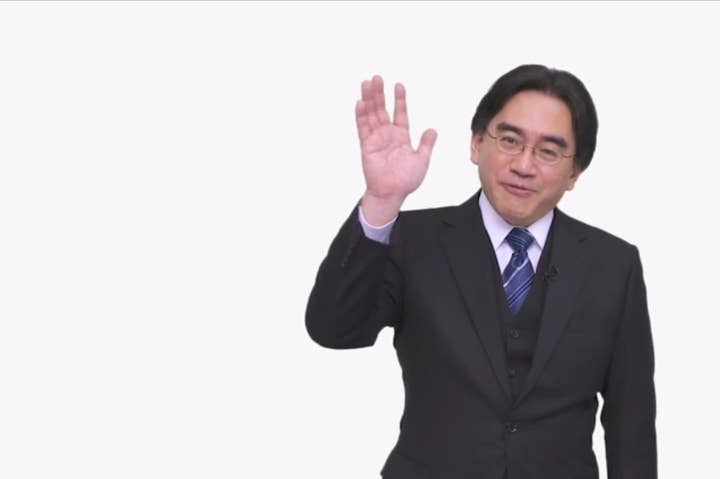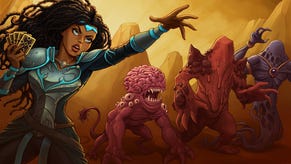Obituary: Satoru Iwata
Enthusiastic, warm and genuine, the Nintendo boss was a unique industry figure who pushed his company to find new ways to entertain and delight
In the flood of tributes and condolences in the wake of the death of Nintendo president Satoru Iwata, one note rings clear and consistent. No matter who talks about Iwata, be they business partners, colleagues, journalists or even rivals, each of them reaches the same conclusion; Satoru Iwata was a nice guy. Warm and likeable, the programmer who rose to become boss of the world's biggest games company - and, for a few crazy years under his tenure, one of the biggest companies in Japan, full stop - never lost the simple decency and honest enthusiasm that had shone through since the start of his remarkable career.
If I may add my own anecdote to the steadily growing mountain, it would only be to reinforce that view. I first met and interviewed Iwata after his Tokyo Game Show keynote in 2005, in which he had introduced the Wiimote to the world, and found him utterly charming; he spoke with an easy, unpracticed logic, eschewing soundbites for genuine conversation in a way that few of his peers among the ranks of games industry executives can manage, and was perfectly happy to let a naïve young journalist from a burgeoning trade site (GamesIndustry.biz was only about three years old at this stage, having launched, coincidentally, around the same time that Iwata took the helm of Nintendo) awkwardly quiz him about the fundamentals of his proud, century-old company. I subsequently encountered him a few times informally; brief encounters at social events, or bypassing one another at a GDC corridor. Each time, he greeted me with genuine warmth, a courtesy he extended, as far as I could see, to everyone with whom he had ever interacted.
Born in 1959, Satoru Iwata grew up in Sapporo, the capital city of Hokkaido, Japan's northernmost island. It was a small but fast-growing city, its population doubling from half a million when Iwata was born to a million by the time he was 10 years old; an interesting contrast to the Kyoto countryside childhood of Iwata's fellow Nintendo luminary Shigeru Miyamoto, which inspired the creation of the Legend of Zelda series. Iwata's interest in videogames began early, and he wrote his first game as a teenager - a baseball game written for one of Hewlett Packard's programmable pocket calculators, its gameplay represented entirely by numbers on the calculator's 8-segment LCD display.
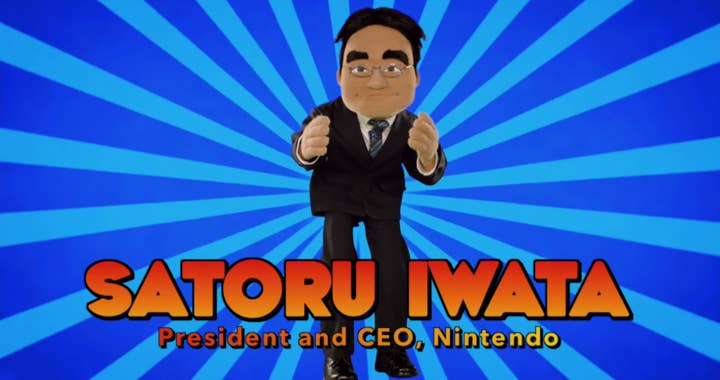
At the age of 19, Iwata moved to Tokyo to study at the Tokyo Institute of Technology, Japan's top technology school, located in the south of the city. Classes at the university focused on engineering subjects, so in his free time, Iwata would travel across Tokyo to Akihabara, then a district with a very different character to today's sanitised nerd haven. There he met like-minded game enthusiasts at stores for imported computer hardware, and ended up renting a flat together with them in the Akihabara district (history does not relate what the resulting lengthy commute to the Tokyo Institute of Technology did to his attendance record). Together, they would create HAL Laboratories; when Iwata graduated, he became the company's fifth full-time employee. In his keynote at GDC 2005, he told the audience that he argued with his father over the decision; in a country almost entirely lacking a startup culture, where joining a large, prestigious company is considered the only natural progression from studying at a famous university, Iwata was joining by far the smallest company of anyone in his graduating class.
With hindsight, it's easy to say that Iwata made the right decision, but it's unlikely that his father saw it that way for quite a few more years. While HAL has, over the years, become one of Nintendo's most important collaborators, it had a rocky start. The firm made its way through the 1980s on the back of a lot of work-for-hire ports of arcade titles to home consoles and occasional successes with its own games, such as the Eggerman series (some of which were released in the west as Adventures of Lolo), but its finances were never stable and even its most senior staff members did consultancy work for other firms, primarily Nintendo, in order to make ends meet - one result being perhaps Iwata's most unusual game credit, as director of the much-lauded North American version of Dragon Quest (titled Dragon Warrior in the US) in 1989.
Nintendo's decision to turn to Iwata to manage the Dragon Warrior release (which was handled by Nintendo, buoyant at the overseas success of the NES, rather than by the game's developer Enix) suggests that by the mid-eighties, it was his management skill that was most valued, rather than his coding ability. Many of his credits on HAL's games of this era are in production roles, although being such a small company meant that everyone did a bit of everything; in Iwata's own words, "I was a programmer, and an engineer, and a designer, and I marketed our games; I also ordered food, and I helped clean up, and it was all great fun". Fun or not, by 1993 HAL's finances had reached a crisis point; with the company on the brink of bankruptcy, Iwata was promoted to president, and is credited with rapidly turning the firm's fortunes around and putting it on a firm financial footing. One way in which this was achieved was by cultivating ever-closer links with Nintendo, to a point where HAL's involvement with the platform holder was a kind of symbiosis far closer than even celebrated "second party" developer Rare. Under Iwata's leadership, HAL cut down on work-for-hire ports and focused on developing exclusive titles for Nintendo - most notably creating the Kirby franchise in 1992, and co-producing much-loved RPG series Mother (EarthBound in the US) with developer Ape Inc. HAL's relationship with Ape was another important tie for the studio; Iwata had a hand in the creation of Creatures Inc., the successor studio to Ape, and HAL (and Iwata personally) worked with the company on various Pokemón titles.
"I was a programmer, and an engineer, and a designer, and I marketed our games; I also ordered food, and I helped clean up, and it was all great fun"
Throughout the 1990s, it's hard to find a successful Nintendo franchise that didn't involve HAL to some degree. The company and its staff were an external appendage of Nintendo, part of a family of studios, internal and external, which combined to make up the most enviable collection of development talent in the world. The extent of Nintendo's trust in their relationship with HAL is perhaps best expressed through 1999's Super Smash Bros., a HAL developed title which used characters from every major Nintendo franchise - reflecting a truly extraordinary degree of creative trust and mutual reliance. The lynchpin in this relationship, it seems, was Iwata himself, and when he crossed over between the two companies in 2000, joining Nintendo as head of corporate planning under mercurial president Hiroshi Yamauchi, he continued to work with HAL as an external consultant. Two years later, he became Yamauchi's successor as president - the first president of Nintendo not to be a member of the Yamauchi family, three generations of whom had run the company since its founding in 1889.
It's worth pausing for a moment to consider how unlikely and unique this career trajectory actually was. For an enthusiast programmer to display management skill at the small studio he sets up with his like-minded friends is not unusual; for that skill to shine to the extent that he becomes a crucial part of the operation of the biggest company in the games industry, promoted at a relatively young age far over the heads of more senior, formally management trained staff, is truly remarkable. Iwata became president of Nintendo at 43, having spent almost his entire working life up to that point not in corporate management but in game creation. With Miyamoto heading up Nintendo EAD - the firm's software development arm and its largest division - this effectively meant that the top two executives at Nintendo were both game creators, not career managers.
Just as when he took over at HAL Laboratories, Iwata's appointment to the top job at Nintendo came at a time of crisis for the company. The GameCube console, though beloved of enthusiasts, was utterly eclipsed by Sony's PlayStation 2, ultimately finding itself fighting for a distant second place position with the Xbox console from industry newcomer Microsoft. Under Iwata's direction, Nintendo worked to build relationships with development and publishing partners which would bring exclusive games to the platform and maintain its relevance; this resulted in titles like Resident Evil 4 launching first on GameCube, although Capcom's decision to rapidly develop and release a PS2 version of the game is seen as a symbol of Nintendo's difficulty in sustaining good third-party relationships through this era, and may have contributed to the company's trend of increasing reliance on first-party titles in subsequent years.
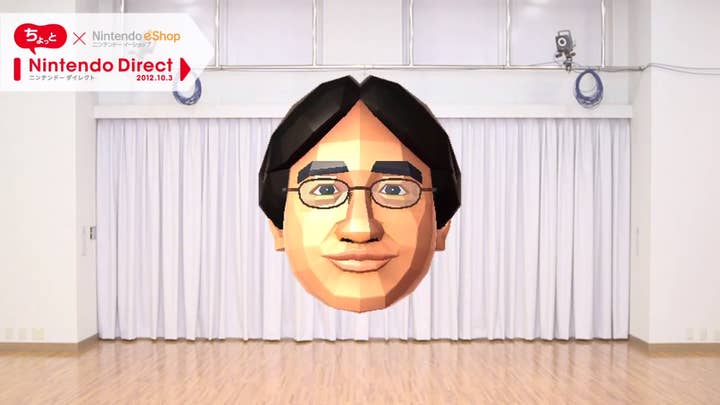
Iwata's belief was that Nintendo needed to be different from its rivals, Sony and Microsoft - titans of the technology world whose budgets could crush even the reasonably wealthy Nintendo in a direct battle for console supremacy. He created a new philosophy for the firm's hardware efforts, drawing upon the concepts expounded by late Nintendo designer Gunpei Yokoi (who also died, in a tragic car accident, at 56), "lateral thinking with seasoned technology" - the notion that the best game systems would be based on cheap, mature technologies being applied in innovative ways - and emphasising Nintendo's history as a toy company, as distinct from a technology firm. The first fruit of this new philosophy was the Nintendo DS, the successor to the company's Game Boy and Game Boy Advance lines of handheld device. The DS was a chunky, relatively low-powered unit with, curiously, two screens, separated by a hinge, the lower of which was a touch panel. It was shown to the world at E3 in 2004; the next day, Sony showed off its first handheld console, the sleek, powerful PlayStation Portable, which had a beautiful, large screen and processing power not dissimilar to the PS2. Nintendo's stock crashed. The company was, for a few days, a laughing-stock; media and analysts attending E3 couldn't figure out the point of the DS, with its strange, awkward layout and Fisher-Price styling. What kind of games could you possibly play on such an odd beast of a console?
To date, the Nintendo DS family of consoles have sold 154 million units worldwide, only a few hundred thousand units behind the lifetime sales of the PlayStation 2; it's the second best selling console in history, and by far the best selling handheld console. A steady stream of innovative, groundbreaking software, much of it developed by Nintendo and its partner studios, saw the console succeed with demographics who had never previously engaged with gaming to a large extent. Forcing game creators to wrap their heads around the new layout and control system of the console, while keeping development costs down thanks to low-powered hardware, turned out to be a masterstroke; the lack of ports of existing titles and familiar genre staples on the system made it feel fresh and innovative throughout its remarkable lifecycle.
"By the time Iwata stood up in Tokyo in September 2005 to announce that the company's next home console would be a diminutive white box with a motion controller that looked more like a simplified TV remote control for elderly people than a joypad, absolutely nobody was poking fun"
By the time Iwata stood up in Tokyo in September 2005 to announce that the company's next home console would be a diminutive white box with a motion controller that looked more like a simplified TV remote control for elderly people than a joypad, absolutely nobody was poking fun. Lots of people didn't get it; years later, there are plenty of core gamers who still don't understand the appeal of the Wii and who rail against it as an example of Nintendo losing its way, but naysayers were too busy picking the egg off their faces after the DS reveal to have any desire to second-guess Nintendo again.
Just as well; the Wii repeated the success of the DS, outselling both Microsoft and Sony's consoles by a factor of two, enjoying a perfectly healthy attach rate of software (in spite of criticisms that it was a console that "gathered dust" in people's homes) and once again giving Nintendo's internal and second-party studios a platform that encouraged innovative, creative approaches to games that appealed to wide audiences beyond the traditional core. In retrospect, some cracks were evident in the model; Nintendo just wasn't as good at finishing and launching home console software as it was with handheld software, suggesting a company either struggling somewhat with technological advances or simply with the management of larger projects. For several years, though, Nintendo was on top of the world - and on top of the stock exchange, with the combined success of the DS and Wii pushing the company's share price to extraordinary levels, at one point topping Japan's stock market with a valuation ahead of even Toyota, the world's largest car manufacturer.
At this point, one would hope, Iwata's father may have acknowledged that joining HAL after university wasn't such a bad idea after all.
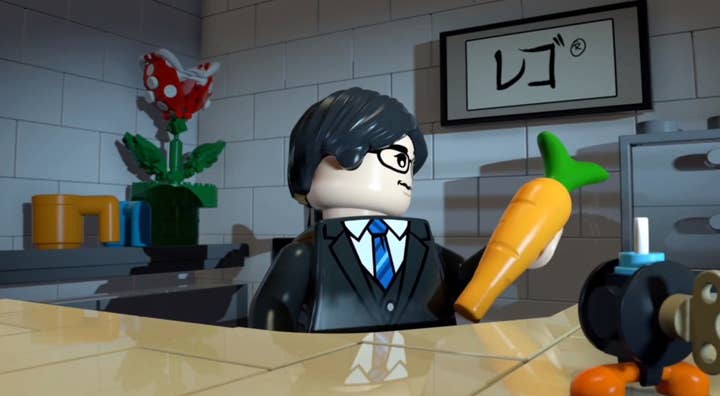
Through it all, Iwata remained a figure defined by his humility and his enthusiasm. His GDC 2005 keynote, recounting his early days in game development and explaining his philosophy of games and fun, was one of the most memorable speeches the Game Developers Conference has ever hosted; passionate, human and deeply connected to the experiences of a hall full of developers and media in love with games. Through his regular Iwata Asks interviews, in which he interviewed creative staff at Nintendo and their associated studios, he revealed more of himself and his thoughts to the company's fans than any games industry boss I can imagine - and his willingness to engage in good-natured self-parody at the company's E3 conferences and, later, in Nintendo Direct online broadcasts, stood in sharp contrast to the aggressive bombast of his rivals at other firms.
The final years of Iwata's tenure at Nintendo saw a downturn in the company's fortunes, as the firm's next iterations of the Wii and DS - the Wii U and 3DS respectively - failed to live up to the performance of their antecedents. A number of tactical mistakes were made; the company failed to grasp the importance of mobile and tablet gaming quickly enough and to react nimbly to the changes it induced in the market (which doesn't necessarily mean they needed to start making mobile games earlier, simply that the WiiU in particular needed to be a stronger response to that challenge), and it blundered badly on the marketing of the 3DS and WiiU, confusing consumers who didn't understand that these were new consoles and not simply accessories or new versions of their existing platforms. When Iwata revealed that he was undergoing treatment for cancer, questions were asked - not always sensitively - about whether this was impairing his ability to guide the massive company through such a tough period of change.
"If he has one legacy, it is that he preserved and promoted something truly unique at Nintendo; an atmosphere in which creativity is treasured and talented people are given the space and the resources required to do their best work"
Yet even through this time, much of Iwata's talent for management continued to shine. If he has one legacy, it is that he preserved and promoted something truly unique at Nintendo; an atmosphere in which creativity is treasured and talented people are given the space and the resources required to do their best work. Under Iwata, even when hardware sales have faltered, Nintendo's software output has gone through a golden age, both on handheld and on home consoles. In recent years, the company has done perhaps the best work it has ever done, even rivalling the output of the glory years of the SNES, and creating by far the finest versions yet of some of its beloved franchises. The last major title released by Nintendo before Iwata's death, Splatoon, perhaps stands as a wonderful symbol of everything he stood for; a joyous, pure slice of fun, reclaimed from the grimdark and violence that define most online shooters such that it can be enjoyed by everyone, even eschewing the grasping DLC business model preferred by such titles in favour of a disc full of content that slowly unlocks over a period of months so that all players can enjoy something fresh each week for free. It's original, risky, beautifully polished and incredibly good fun, and in Japan, at least, it's been sold out on a regular basis since its launch. If Iwata is to be remembered for anything, it should be for having nurtured and protected the creative environment that allowed games like Splatoon to exist.
Satoru Iwata's death at the age of 56 came as a shock not simply because he was believed to be recovering from his cancer treatment, but because he had refused to let his ill health stop him from doing the job he clearly loved so deeply. He worked right up until the end, running Nintendo's shareholders meeting as recently as the end of June. Flags outside the Nintendo offices in Kyoto were lowered to half-mast at the news of his death, while tributes and condolences poured in both from industry figures, and from gamers themselves, who flooded Nintendo's Miiverse online service with messages of thanks for Iwata's work over the years.
In his GDC 2005 keynote, Iwata told the audience that "on my business card, I am a corporate president. In my mind, I am a game developer. But in my heart, I am a gamer". How many presidents and CEOs of large gaming companies could address that to an audience of developers without sounding false? The same enthusiasm which led him to learn to code on a pocket calculator in the 1970s to entertain his high school friends with a baseball stats game continued to drive him throughout his career; that enthusiasm will be sorely missed from the industry.
